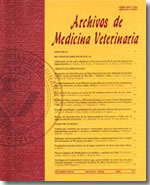Evaluation of the effect of a pigeon poxvirus autogenous vaccine
Main Article Content
Abstract
The aim of this study was to compare the protective effectiveness of a homologous vaccine against pigeon avipoxvirus with that of a commercial heterologous vaccine against chicken avipoxvirus, by challenging pigeons with pigeon avipoxvirus. The pigeon avipoxvirus was isolated from skin lesions of infected pigeons and then inocculated on chick embryo chorioallantoic membrane (CAM). The virus was identified by histopathology, polymerase chain reaction and restriction enzyme analysis. Subsequently, the virus was attenuated by several passages in CAM and used as a vaccine when reaching a viral titer of 104.37 DIEP50%/mL. Pigeons vaccinated with the homologous vaccine (n = 20) achieved serum neutralizing titers of 1/61,5 while those vaccinated with the heterologous vaccine (n = 20) achieved serum neutralizing titers of zero. Finally, when animals were challenged with pigeon avipoxvirus, all pigeons from the homologous vaccine group were protected, while in the heterologous vaccine and non-vaccinated control (n = 20) groups, no protection was achieved. In conclusion, the use of an homologous vaccine against poxvirus when working with pigeons, generates neutralizing antibodies and confers a much better protection against infection when compared to the use of commercial vaccines made against the chicken poxvirus.

